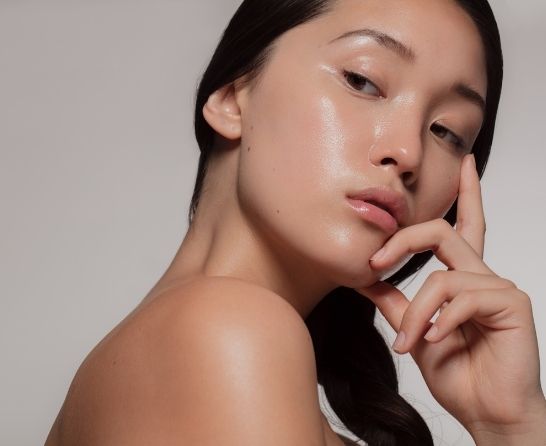Published 16 September 2024
-
Written by Emma Matthews

Reviewed by Dr. Abhinav Singh
Fact checking standards
Key takeaways
In a slight deviation from our usual weekly dose of mildly depressing hormone news, this week, we’re bringing you some good news! And that’s because we’re talking about how Estrogen can actually do some fantastic things for your skin and hair. But, more importantly, it also has a fantastic effect on how you feel about the way you look.
With us so far? Gang, what we’re saying is, that when Estrogen is working for you, you’re at your absolute best. So, how exactly, does a hormone that generally makes our lives hell, also have such a positive effect on us?
Estrogen at its best
First off, as with all hormones, balance is everything. Too much or too little can lead to serious physical and emotional symptoms that often require medical intervention of some sort.
But, like Goldilocks, when levels are just right, your skin, hair, and self-confidence reap the not-inconsiderable benefits. Have you ever noticed, around the second week of your cycle, or the week before ovulation to get technical, that you’re just… More you? That’s Estrogen.
Estrogen and our skin
At the right levels, Estrogen helps boost the levels of some vital ingredients for great skin. Collagen, hyaluronic acid, and elastin all increase when Estrogen levels are just-so, and the result is a smoother, more hydrated, and plumper face. In short, you glow. That goes double if you’re pregnant. And it’s all down to your hormones.
Estrogen and our hair
Where hair is concerned, elevated Estrogen actively encourages dormant hair follicles to get back to work. Your hair suddenly looks more full, because it is. You literally have more hair. And it’s healthier because it’s so new. This means your barnet never looks better than during the second week of your cycle. Did we tell you this was good news?
Estrogen and our confidence
But what about this confidence-boosting effect we mentioned earlier? Well, not only do you look great, but higher Estrogen levels mean that you also think that you look great. You love your hair, your skin, what wobbly bits, you’re a Goddess, that sort of thing.
And that’s thanks to the relationship between Estrogen and Serotonin, something we’re all extremely familiar with. In essence, it’s basically reverse-PMS. High levels make you happy, low levels make you want to eat a tub of Dulce Du Leche and scream at your thighs.
Why understanding your patterns is important
So why are we telling you all of this? Don’t worry, we haven’t brought you all this way just to slip the depressing part in right at the end. Quite the opposite, in fact.
Because, just as with PMS, when you know that how you’re feeling can be down to your hormones, those peaks and valleys become a tad bit easier to handle. Plus, isn’t it nice to know that, at least once a month, your hormones are actually helping you in ways that make you look and feel amazing? And that’s something we can all be happy about it. Here’s to glowing like it’s the week before ovulation!
Disclaimer: This website does not provide medical advice. The information, including but not limited to, text, graphics, images and other material contained on this website are for informational purposes only. No material on this site is intended to be a substitute for professional medical advice, diagnosis, or treatment. Always seek the advice of your physician or other qualified healthcare provider with any questions you may have regarding a medical condition or treatment and before undertaking a new healthcare regimen, and never disregard professional medical advice or delay in seeking it because of something you have read on this website.
Disclaimer: This website does not provide medical advice. The information, including but not limited to, text, graphics, images, and other material contained on this website is for informational purposes only. No material on this site is intended to be a substitute for professional medical advice, diagnosis, or treatment. Always seek the advice of your physician or other qualified healthcare provider with any questions you may have regarding a medical condition or treatment and before undertaking a new healthcare regimen, and never disregard professional medical advice or delay in seeking it because of something you have read on this website.
Written by
Emma Matthews
Reviewed by

Dr. Abhinav Singh
Dr Singh is the Medical Director of the Indiana Sleep Center. His research and clinical practice focuses on the myriad of sleep.





